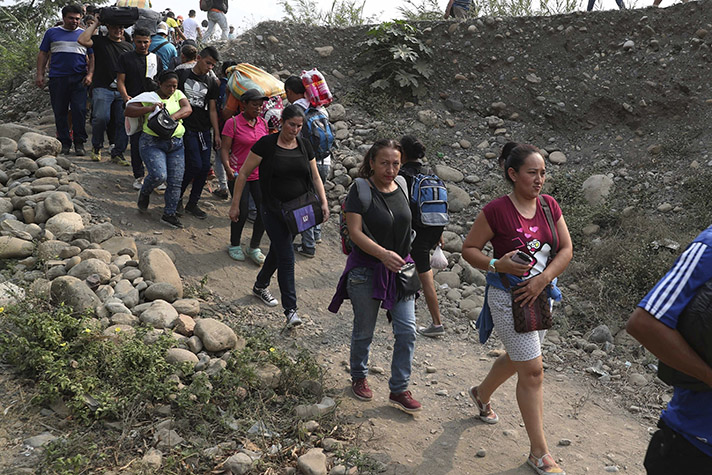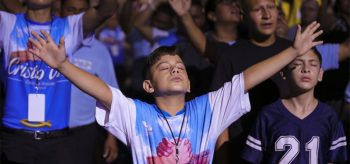
This week, leading up to Easter, tens of thousands are expected to make their way into a soccer stadium in the forgotten city of Cúcuta, Colombia, to attend the Festival of Hope (Festival de Esperanza) with Franklin Graham.
“I’ll be preaching about God’s love and forgiveness to the people not only of Colombia, but people from Venezuela who have come across the border,” Franklin Graham shared on Facebook.
Less than four miles from Venezuela’s border, Franklin will preach words of life to some who are hungry, without jobs or wearing the only set of clothing they own. Facing economic and political crisis, these people will come for the name of the Festival itself: hope.
“The situation in both places [Venezuela and Colombia] is very difficult for a variety of reasons,” said Chris Swanson, the Billy Graham Evangelistic Association’s director of Latin America affairs. “For the Gospel, which is the message of hope, to come in such an intentional, specific way as it is through the Festival of Hope, is huge for these people.”
While preparing for the Festival over the past few months, he’s witnessed the impact of the Venezuela crisis and its affect on the people of Cúcuta.
Walking along the streets of Cúcuta, he can often tell who’s Venezuelan just by their physique—many have lost a lot of weight due to hunger.
“It’s really bad,” he said. “I don’t think that’s an exaggerated statement.”
Franklin Graham said he’s going to the border city “to shine a spotlight not only on their suffering, but on the fact that God loves them so much that He sent His Son, Jesus Christ, to die on a cross for their sins.”
Cúcuteños are also facing their own battles of “violence, contrabands and narco-trafficking,” said local pastor Jorge Rojas, who’s been working alongside Swanson on Festival preparations.
Originally from Bogotá, Rojas has called Cúcuta home for the past eight years, witnessing the city’s hardships and influx of migrants.
“I want to make Jesus known throughout the people of the city,” he said. And for the first time, he’s seen its pastors and churches unite, with 340 churches participating in the Festival.
“United we achieve more,” Rojas continued, sharing the common Spanish phrase, “Unidos logramos más.”
“It’s a miracle that the body of Christ from many different denominations [in the city] are uniting for one cause,” he said, estimating 90 percent of the Cúcutas’ pastors are involved in the Festival.
He’s hoping that “the Festival will leave a new aroma … a revival. The church in Cúcuta will not be the same.”
More Than a Destination
Two weeks ago, Swanson hopped into a taxi and headed to Cúcuta’s airport.
Speaking with his taxi driver Mateo*, he brought up the Festival, just as he usually does when he takes a taxi.
“Pretty much every time I mention the Festival, the driver will say, ‘I know all about that … I’m excited to be there,'” Swanson recalled.
But this time, when Swanson mentioned “the event coming up Easter week,” the driver had no idea what he meant—glancing in the rearview mirror with a puzzled look in his eyes.
As Swanson explained, Mateo’s eyes became misty, and a tear rolled down his face.
“Am I offending you?” Swanson asked.
He shook his head, chin quivering.
While navigating traffic, Mateo went on to share the route of his life, concluding with, “Chris, I’m all alone. I have no hope. My wife, children, grandchildren … I literally have no one.”
Turning in his seat, he asked Swanson if it was OK to come to the Festival alone.
“I’ll tell you what, you come every time, every day, every moment we have that stadium open … you come by yourself,” Swanson said. “But I assure you that you will not leave by yourself. You will leave cared for by a God who loves you deeply and delights Himself in you.”
*Name changed for privacy.
You never have to be alone. Start a relationship with Christ today.


